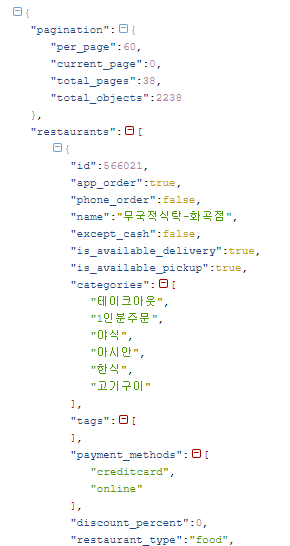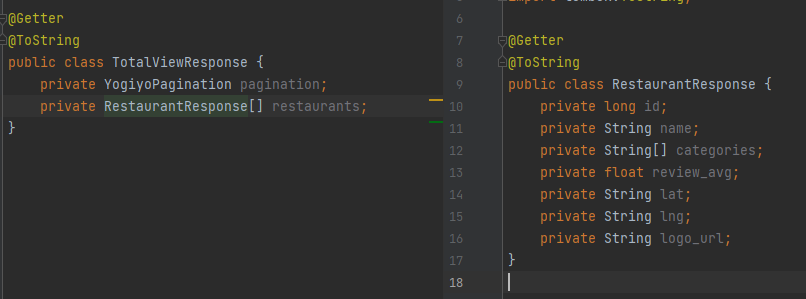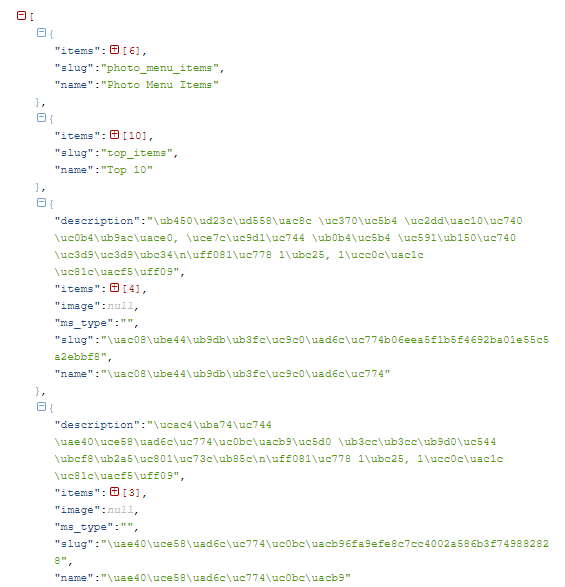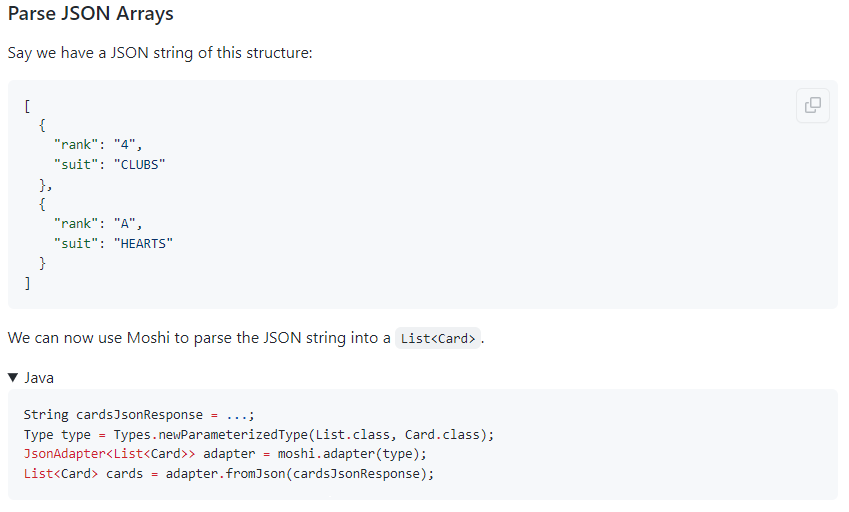#import
Moshi는 Java나 Kotlin에서 JSON 형태의 데이터를,
Java 객체 형태로 역직렬화나 그 반대로 직렬화 용도로 많이 사용하는 Library이다.

이런 형태의 JSON 데이터를

Java Class 에서 Field명을 JSON의 Key 값을 맞춰 주어 역직렬화
오늘은 아래와 같이 JSON Key 값 없이 JSON Array 형태의 JSON 데이터를,
Moshi로 역직렬화 하는 방법을 알아보려한다.

JSON Key 값이 없는데 역직렬화 객체 Field 명을 어떻게 붙여줘야하지,,,??
라는 생각을 1시간전 나처럼 하신 분들을 위해
공식문서
특정 Library를 사용하다 생기는 고민은 결국 공식문서를 살펴보는게 가장 빠르고 현명한 방법이다.
Moshi 공식문서를 살펴보면 아래와 같은 JSON Array 형태를 파싱하는 방법도 설명되어 있다.

Moshi는 Key값이 없는 JSON Array 형태 데이터의 경우,
데이터 내부 형식에 맞춘 Class의 Java Reflect Type을,
매개변수로 하는 Moshi Adapter를 제공한다.
바로 예제 코드와 함께 살펴보자.
예제
먼저 아래와 같은 JSON Array 데이터가 있다고 하자.
{
"items":[
{},
{},
{},
{},
{},
{
"image":"https://images.yogiyo.co.kr/image/yogiyo/PARTNER_FR_IMG/%EC%AB%84%EB%A9%B4%EC%A3%BC%EB%8A%94%EC%82%BC%EA%B2%B9%EB%B3%B8%EB%8A%A5/2021-03-30/%EC%A0%9C%ED%9C%B4FR_20210329_%EC%AB%84%EB%A9%B4%EC%A3%BC%EB%8A%94%EC%82%BC%EA%B2%B9%EB%B3%B8%EB%8A%A5_%EC%99%95%EA%B0%88%EB%B9%84%EB%A7%9B%EB%8F%BC%EC%A7%80%EA%B5%AC%EC%9D%B44%EC%9D%B8_1080x640.jpg?width=1080&height=640&quality=70",
"id":235590842,
"price":"16900",
"name":"\uac08\ube44\ub9db\ub3fc\uc9c0\uad6c\uc7744\uc778"
}
],
"slug":"photo_menu_items",
"name":"Photo Menu Items"
},
{
"description":"\ub450\ud23c\ud558\uac8c \uc370\uc5b4 \uc2dd\uac10\uc740 \uc0b4\ub9ac\uace0, \uce7c\uc9d1\uc744 \ub0b4\uc5b4 \uc591\ub150\uc740 \uc3d9\uc3d9\ubc34\n\uff081\uc778 1\ubc25, 1\ucc0c\uac1c \uc81c\uacf5\uff09",
"items":[],
"image":null,
"slug":"photo_menu_items",
"name":"\uac08\ube44\ub9db\ub3fc\uc9c0\uad6c\uc7744\uc778"
}위 JSON Array 데이터 처럼 Key 값으로 데이터가 존재하진 않지만,
각 Array index안에서 items, slug, name, description, image 형태의 Key 값이 존재하고,
items 안에는 image, id, price, name 형태의 Key 값이 존재한다.
이러한 형태를 Java에서 Class 형태로 생성하면 아래와 같은데,
import lombok.Getter;
import lombok.ToString;
@Getter
@ToString
public class MenuTypeResponse {
private MenuResponse[] items;
private String slug;
private String name;
private String description;
}
import lombok.Getter;
import lombok.ToString;
@Getter
@ToString
public class MenuResponse {
private long id;
private String name;
private String description;
private int price;
private String image;
private String original_image;
}여기서 MenuTypeResponse는 최 외부 JSON Array의 각 Index 안의 형태를 포매팅한 Class이고,
MenuResponse는 내부에 items keyword의 JSON 형태를 포매팅한 Class이다.
이렇게 JSON Array Index 안의 요소를 Class 형태로 포매팅 했다면
아래와 같이 Moshi를 생성할 때 adapter안에,
최종 역직렬화 할 Collection Class와,
해당 최외부 포매팅 Class를,
Reflect Type 형태로 선언하여 사용하면 역직렬화 할 수 있다.
// Java Reflect Type 선언
Type type = Types.newParameterizedType(List.class, MenuTypeResponse.class);
// Moshi 생성시에 adapter에 해당 Type을 매개변수로 사용
List<MenuTypeResponse> result = (List<MenuTypeResponse>) new Moshi.Builder()
.build()
.adapter(type)
// 해당 매개변수에는 Json 데이터를 사용
.fromJson(response.body().source());
